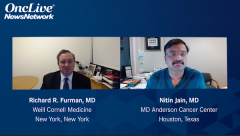
Novel Treatments for the Management of CLL
Nitin Jain, MD, comments on the use of novel treatment strategies, including CAR T-cell therapy, being evaluated to treat patients with CLL.
Episodes in this series

Richard R. Furman, MD: What do you think about other novel therapies, including CAR [chimeric antigen receptor] T-cell therapy? Where do you see that fitting in?
Nitin Jain, MD: The CAR T-cell data are emerging. Certainly, the most advanced data we have is with the BMS [Bristol Myers Squibb] lisocabtagene maraleucel CAR, which was presented at the last ASH [American Society of Hematology Annual Meeting]. I believe there’s an update at this ASH meeting as well. Those data are from a small number of patients. In the lisocabtagene maraleucel plus ibrutinib cohort, there were 18 or 21 patients. A small number of patients were treated, relatively speaking. But the majority of them achieved a CR [complete response], including MRD [minimal residual disease]–negative CR in the bone marrow. The follow-up was short at that time, so it will be interesting to see the durability of these remissions at this ASH meeting.
CAR T certainly has a role. In my opinion, the role would be for patients who have failed at least 1 targeted therapy, but many times they’ve failed BTK [Bruton tyrosine kinase] and a BCL2-based therapy. That’s certainly a group of patients in whom CAR T should be pursued, because you can get very deep, long-lasting remissions with CAR T. I believe that. Obviously, the field of CAR T is evolving so rapidly, and CLL [chronic lymphocytic leukemia] is slightly behind. But obviously, we know from lymphoma, ALL [acute lymphocytic leukemia], and multiple myeloma, with subsequent CAR T trials and constructs that have been developed, and allogeneic CAR T being developed, that the field of CAR T for CLL will continue to evolve.
We may start seeing more patients treated in earlier lines of therapy where you’ve achieved remission, you’re still MRD-positive, and you’re getting to a CAR T to ablate the disease, which is being thought about in lymphomas and in B-cell ALL. The only thing is that for CLL, the number of patients who’ve been treated in trials is very few compared with the data we’re seeing with ALL and certainly with diffuse large B-cell lymphoma.
Richard R. Furman, MD: Thinking ahead, you touched on the allogeneic CAR T cells, and of course we have the new NK [natural killer] CARs. Do the NK CARs and the allogeneic CARs represent anything more than just an easier source of CARs? Or is there something different in terms of efficacy and tolerability that we’d expect to see with these novel approaches?
Nitin Jain, MD: One thing that’s different about these allogeneic CARs is that we know in the autologous CAR setting, you’re taking the T cells out of the patient. We know from multiple studies over the last 2 decades, plus there’s a lot of T-cell dysfunction among T cells derived from patients with CLL. There’s high PD-1, PD-L1, and CTLA4, so these T cells are exhausted. Making CARs out of these exhausted T cells in the autologous setting might not be the best idea. But if you then introduce an allogeneic CAR or NK cells—which are also allogeneic—in that portion of the population, then you’re introducing a CAR derived from healthy T cells. I believe that’s an approach that should be tested in patients with CLL because you may see an incremental benefit, because right now you’re using impaired dysfunctional T cells as your source.
In the context of CLL, maybe it’s more important to test allogeneic CARs and NK CARs as opposed to other disease subsets, where there might not be the T-cell dysfunction that’s known from the T-cell population in patients with CLL. Certainly, allogeneic CARs are easily available and ready to go. You can send the patient, start the fludarabine-cyclophosphamide, and then give the CARs the next day as opposed to autologous CAR, where you have to wait for leukapheresis and then for the cells to be manufactured. There are pros and cons for these approaches. So far, the data for the allogeneic CARs have shown that there isn’t much persistence of these CARs beyond 1 month. But the next-generation allogeneic CARs are coming along, they’re trying to increase the persistence of these CARs. We’ll have to see how the data mature, but I believe that allogeneic CARs should be tested for patients with CLL.
Richard R. Furman, MD: Thank you.
Transcript Edited for Clarity







































